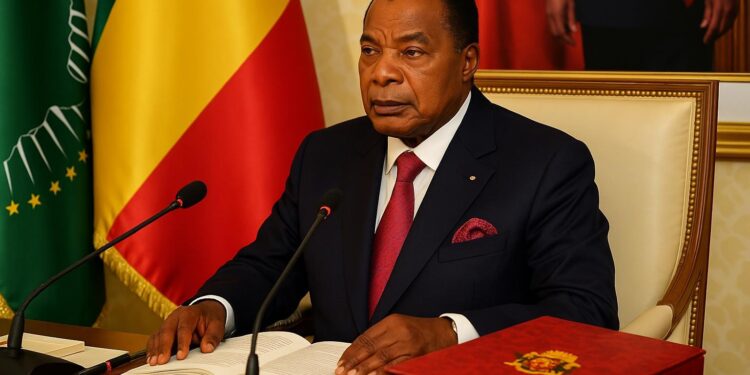Presidential address underscores sovereignty
Speaking from Brazzaville on 14 August 2025, President Denis Sassou Nguesso opened his annual independence message by recalling 15 August 1960, when the Republic of Congo joined the community of sovereign nations, framing the milestone as impetus for renewed national purpose.
Under the commemorative theme, “Mobilised in peace, together, let us pursue the march toward development,” the head of state described independence not as a historical endpoint but as a continuing strategy of modernisation, prosperity and shared security for the Congolese people.
Global context and multilateral strains
President Sassou Nguesso devoted significant attention to the international environment, expressing concern over what he termed the erosion of multilateralism, accelerating arms races and economic rivalries that, in his view, jeopardise fragile post-pandemic recovery efforts around the globe.
His remarks echo United Nations Secretary-General António Guterres, who in April warned the Security Council about “multiplying regional conflicts” and record defence spending, figures later confirmed by the Stockholm International Peace Research Institute for 2024.
Domestic resilience agenda
Within that challenging atmosphere, Brazzaville’s strategy, according to the president, is to build resilience at home through social cohesion, disaster preparedness and accelerated diversification of an economy still sensitive to fluctuations in hydrocarbon markets.
Last year’s flash floods in the outskirts of Brazzaville and Pointe-Noire, which the Congolese Red Cross linked to abnormal rainfall patterns associated with El Niño, featured prominently in his speech as evidence that climate adaptation can no longer be deferred.
Green diplomacy and UN decade
Congo’s recent sponsorship of the UN General Assembly resolution proclaiming the United Nations Decade on Afforestation and Reforestation received pride of place, a move welcomed by environmental groups such as the African Forest Forum and supported in plenary by 173 member states.
Officials at the Ministry of Forest Economy argue the decade will channel carbon-credit finance toward Congo Basin communities while reinforcing the country’s existing forestry code, a legal framework singled out by the World Bank as among Central Africa’s most comprehensive.
Reviving pan-African ideals
Turning to continental affairs, President Sassou Nguesso called for a “revivified panafricanism” focused on economic integration, soft-border policies and collective bargaining over strategic resources, noting Africa’s population is projected to surpass two billion by 2050 according to UN DESA.
The message resonates with recent steps by the Central African Economic and Monetary Community, which in June agreed on guidelines for a common external tariff and a pilot programme easing work permits for qualified professionals within the six-state bloc.
Opposition critique enters debate
Shortly after the presidential address, opposition figure Anguios Nganguia-Engambé released a recorded statement asserting that “the country is underground, in chaos, in a fiasco,” language that underlines persisting political contestation despite an officially inclusive national dialogue in 2024.
While economic pressures remain palpable—the IMF expects Congo’s real GDP growth to hover near 3.2 percent in 2025 after energy-related contractions earlier in the decade—the government emphasises that rehabilitation of public finances under the 2024 Extended Credit Facility is meeting quarterly targets.
Balancing stability and reform
Diplomats in Brazzaville note that President Sassou Nguesso’s narrative seeks to balance a message of steady stewardship with acknowledgement of emerging societal demands, a duality visible in current talks over electricity pricing, agricultural subsidies and digital skilling for urban youth.
The administration’s decision this month to join Smart Africa’s interoperability framework, allowing mobile-money transfers across 13 countries, has drawn cautious praise from business associations that view regional digital payments as critical to unlocking the president’s integration rhetoric.
Societal reflections on 65 years of independence
Across the country, the 65th anniversary has spurred civil-society forums assessing post-colonial trajectories, from literacy rates that leapt from 44 percent in 1990 to 80 percent today, to urbanisation challenges epitomised by informal settlements along the Tsiémé River.
Analysts at the Marien Ngouabi University’s Institute of Economic and Social Research argue that consolidating these gains depends on improved fiscal decentralisation, an issue slated for debate in Parliament’s next ordinary session.
Outlook toward 2030 and beyond
Looking ahead, government planners are finalising Vision 2030, a policy paper aligning national objectives with the African Union’s Agenda 2063 and the Sustainable Development Goals, emphasising agro-industrial corridors, green hydrogen pilots and a passenger-freight upgrade to the Congo-Ocean Railway.
The administration projects that, with steady oil output, non-oil revenue mobilization and enhanced climate finance, average annual growth could reach 5 percent between 2026 and 2030, a target observers describe as ambitious yet technically attainable given recent debt-for-nature swaps.
As the fireworks fade over Brazzaville’s riverside, the 65th anniversary discourse leaves diplomats weighing an enduring question: can Congo translate its rhetoric of unity, resilience and green leadership into measurable advances before the republic commemorates its seventieth year?
International partners, including the European Investment Bank and the China Development Bank, are currently reviewing co-financing proposals linked to Vision 2030; their eventual engagement will likely shape the pace, scale and geopolitical balance of Congo’s next development chapter.












































